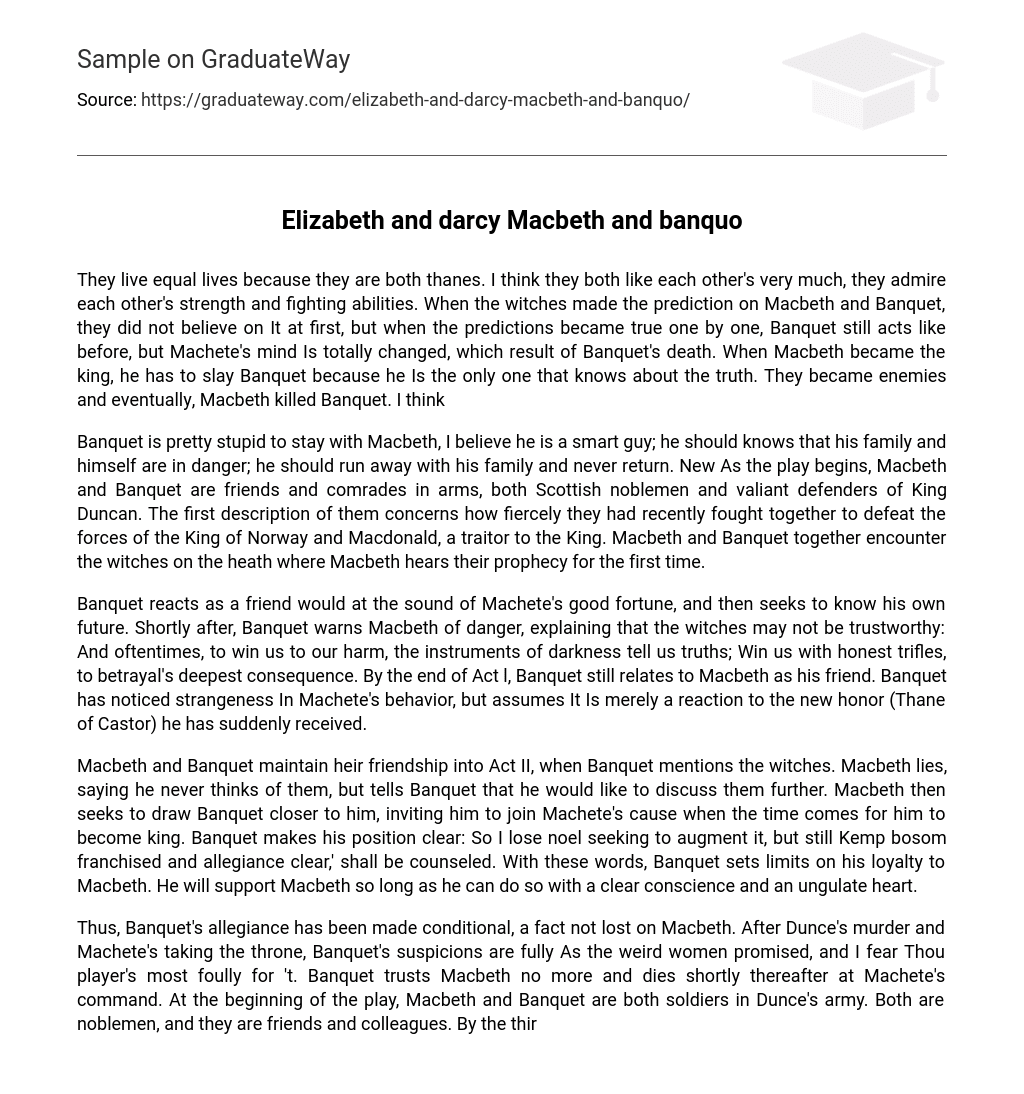They both live equal lives because they are both thanes. I believe they have a great admiration for each other, particularly in terms of their strength and fighting abilities. Initially, when the witches made their predictions regarding Macbeth and Banquet, neither of them believed it. However, as the predictions began to come true one by one, Banquet continued to act as he always had, while Macbeth’s mindset underwent a complete transformation. This ultimately led to Banquet’s demise. Once Macbeth became king, he was forced to kill Banquet because he was the only one aware of the truth. This turned them into enemies and eventually resulted in Macbeth killing Banquet.
I think Banquet is foolish for staying with Macbeth. He should be aware that both his family and himself are in danger. It would be wise for him to escape with his family and never come back. As the play begins, Macbeth and Banquet are portrayed as friends and comrades in arms. They are both Scottish noblemen and brave defenders of King Duncan. They recently fought together with great valor to defeat the forces of the King of Norway and Macdonald, a traitor to the King. Macbeth and Banquet come across the witches on the heath, where Macbeth first hears their prophecy.
Banquet reacts to Machete’s good fortune with the same enthusiasm as a friend, and then becomes curious about his own future. Shortly after, Banquet warns Macbeth about the potential danger, expressing doubt in the witches’ trustworthiness: “And oftentimes, to win us to our harm, the instruments of darkness tell us truths; Win us with honest trifles, to betrayal’s deepest consequence.” By the end of Act I, Banquet still maintains a friendly relationship with Macbeth. Banquet has observed peculiarities in Machete’s behavior but assumes that it is only a reaction to the unexpected honor of becoming the Thane of Castor.
In Act II, Macbeth and Banquet’s friendship remains intact until Banquet brings up the witches. Macbeth lies and denies thinking about them, but expresses interest in discussing them further. Macbeth then tries to gain Banquet’s loyalty, inviting him to join him when he becomes king. With his response, Banquet sets boundaries for his allegiance to Macbeth. He will support him as long as he can do so with a clear conscience and a sincere heart.
Thus, Banquet’s loyalty has become conditional, a fact that Macbeth is aware of. After the murder of Duncan and Macbeth’s ascension to the throne, Banquet’s suspicions are confirmed, just as the witches predicted. I fear you, Macbeth, have played your most wickedly on me. Banquet no longer trusts Macbeth and dies shortly after being ordered by Macbeth. Initially, in the play, both Macbeth and Banquet are soldiers in Duncan’s army. They are both noble and close friends. However, by the third act, each suspect the other of hindering their ambitions, resulting in Macbeth killing Banquet. In Act 1, Macbeth and Banquet are of nearly equal status.
When they encounter the witches, they learn that Macbeth will become Thane of Castor and later the king, while Banquo’s sons will also inherit the throne. Neither man appears to take the prophecy seriously, although Banquo seems more unsettled than Macbeth. Later, when they hear that Macbeth has been made Thane of Castor due to his bravery in slaying the previous traitorous title-holder, Banquo questions, “can the devil speak true?” while Macbeth wonders why he is being rewarded with “borrowed robes” (Act 1, Scene 3). Nonetheless, Macbeth is troubled by Banquo’s reaction to the witches and asks if he does not desire his sons to become kings.
Banquet expresses his concerns about Machete’s sudden interest in the crown. He believes that sometimes the truth can be used against us, luring us with honesty only to ultimately betray us. Macbeth, upon hearing the news, questions whether Banquet is on his side. Banquet observes that Macbeth appears to be deep in thought.
Banquet is already becoming concerned about the impact of Machete’s ambitions. In their minds, separate conversations are happening. Macbeth contemplates, “chance may crown me without my stir,” while Banquet ponders that “new honors come upon him, Like our strange garments” (Act 1, Scene 3). Macbeth speculates about the possibility of becoming king effortlessly, while Banquet questions the suitability of Machete’s promotion. By the time Macbeth takes action, Banquet is already wary of Machete’s ascent to power.
He is fearful that Macbeth has acted dishonestly (Act 3, scene 1). He observes that nobody else seems to comprehend Macbeth’s actions. He also ponders whether his own prediction will come true and his sons will become kings. This is not Macbeth’s ambition alone as he is also suspicious of Banquo. He is apprehensive that if his prophecy is fulfilled, so might Banquo’s. Macbeth is frustrated with his meaningless authority and acknowledges that he must eliminate Banquo if he wants to maintain his kingship and have sons who will rule. Therefore, Macbeth concludes that the only solution is to murder Banquo.





